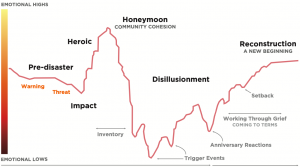The need to reconnect, rethink and reenergise has never been greater, with COVID-19 impacting wellbeing and bringing the importance of in-person interaction in organisations to the fore:
- – Levels of all measures of wellbeing in the UK are the lowest since records began.
- – The negative association between COVID-19 and wellbeing is worse for women than for men, and for ethnic minority groups on some measures.
- – Key workers are currently reporting higher levels of satisfaction, but also higher levels of anxiety than other workers.
- – The effect is around twice the magnitude of the impact of redundancy (in normal times) on wellbeing.
Source: The Wellbeing Costs of COVID-19 in the UK: An independent Research Report by Simetrica-Jacobs and the London School of Economics and Political Science https://www.jacobs.com/sites/default/files/2020-05/jacobs-wellbeing-costs-of-covid-19-uk.pdf
As organisations look to recover and reconstruct, addressing levels of staff wellbeing is rising up the priority list. Businesses are finding new ways to reenergise and reboot their leaders and teams away from the screen interactions which have become the norm, by turning to the great outdoors as a way of staying safe whilst reconnecting.
Why is connection important?
Social interactions play an essential role in wellbeing, which in turn, has a positive impact on employee engagement. Organisations with higher levels of employee engagement indicated lower business costs, improved performance outcomes, lower staff turnover and absenteeism, and fewer safety incidents (Gallup, 2015).
During the Pandemic, organisations have turned to Zoom and other online platforms as a way of doing business, but individuals are mourning the social aspects of being in the office, whether it be quick chats at the water cooler, or over coffee to share ideas, particularly given that the time and space to reflect or unwind whilst commuting may be gone.
The model below demonstrates the phases of psychological response to disaster, which may fit with the Covid crisis. As organisations move to ‘Reconstruction’: bringing staff back from furlough; pivoting strategies; and embracing the new ways of doing business, new ways to support and connect staff are needed.
Phases of psychological response to disaster
 TIME
TIME
Adapted from: Zunin/Meyers, as cited in Training Manual for Mental Health and Human Service Workers in Major Disasters, U.S. Department of Health and Human Services (2000).
The benefits of green or forest bathing
The Japanese have known for years that spending mindful time in nature is beneficial for body and soul. Now Western medical professionals agree, often prescribing outdoor pursuits as a way of coping with depression and anxiety. Green bathing is an opportunity for people to take time out and connect with nature. Organisations are capitalising on the benefits of this to bring people together, to address wellbeing and start the process of reconnecting.
Harvard physician Eva M.Selhub, co-author of Your Brain on Nature, says a drop of nature is like a drop of morphine to the brain since it stimulates reward neurons in your brain, turns off stress response to lower cortisol levels, lowers heart rates and blood pressure. And, when stress is low, focus is possible, which fosters more productive meetings and greater creativity. Using outdoor space, walking paths and facilitated sessions allows individuals to relax, communicate, share experiences and fosters creative thinking and a future focus.
Get in touch with Sally to find out more [email protected]